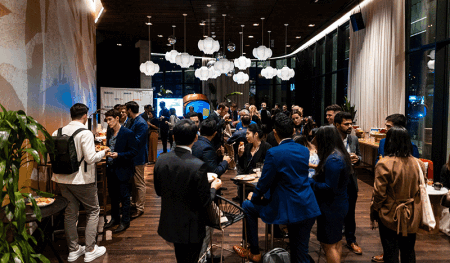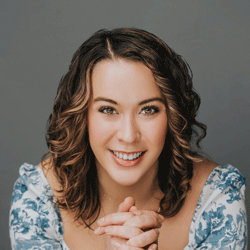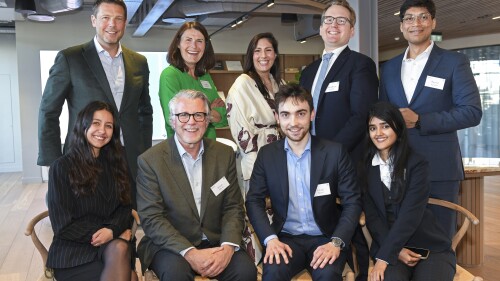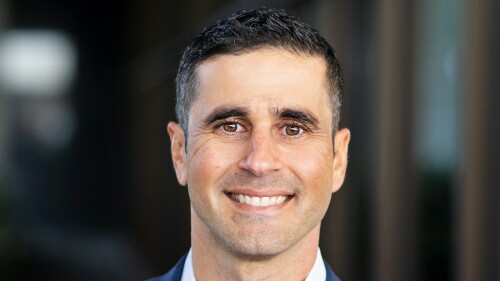Integrated into virtually all of the Urban Land Institute’s local district councils, the Young Leaders Group (YLG) network gives professionals under the age of 35 ways to connect with each other and hone their leadership skills and knowledge about the built environment. Globally, young professionals represent about one quarter of the Institute’s overall membership of 45,000. In 2021, the Americas YLG Committee was formed to better support and connect the more than 50 YLG district council cohorts in the United States, Canada, and Mexico. Since then, the committee has grown to include 50 members.
Urban Land spoke with co-chairs Chandler Hogue, director of Gemdale USA Corporation in Pasadena, California, and Katie Maslechko, director of development for Beedie in Vancouver, British Columbia, about how the committee works to empower its members to contribute to ULI and help shape the future of the built environment.
How did the Young Leaders Group Steering Committee come about and why?
Katie Maslechko: In the Americas, ULI has more than 50 district councils in cities across the United States, Canada, and Mexico, each with its own Young Leaders Group. Over the years, YLGs saw great value in learning from one another and a need to formalize YLG at the Americas level, not only to strengthen the connections among young leaders, but also to give them a larger voice within ULI.
It’s a tangible representation of ULI’s commitment to shaping the future of the built environment by investing in and engaging with those who will one day lead the organization. Ultimately, we are also a vehicle through which anyone, regardless of age, can make a directed and focused impact on the future of our industry, regardless of whether you are investing your time, your resources, your dollars, or your passion.
Why now?
Chandler Hogue: With the pandemic, there were a lot of cultural shifts happening, especially in regards to racial equity. As the commercial real estate industry became aware of its need to diversify its employees and key stakeholders, YLGs are an obvious first place to tap into, as we are a naturally more diverse group. The steering committee is capitalizing on the increased focus to create space for YLGers at all levels of ULI and commercial real estate. It’s not just about the marketed forms of diversity, but also about seeing value in multiple perspectives and opinions.
What are the steering committee’s goals?
Hogue: Initially, I thought the steering committee would create programming and content that we could deliver to the Americas, so the YLGs could be more standardized. But that’s not what they need from us. We are evolving now into more of an advocacy group for the district councils, empowering them and creating space for the young leaders. We’re allowing the 10,000 members of the YLGs to tell us what they want to see. We’re trying to build processes and systems that allow us to collect information so we know what we need to focus on.
Maslechko: It’s about connecting young leaders to one another, because they will rise through this industry together. It’s about creating a broader diversity of leadership initiatives, dialogue, and opportunities for engagement, and more transparent and equitable access to those opportunities that may influence the impact leaders have on their communities or equip them with the context and global perspective to make impactful decisions on behalf of their organizations, the industry, and ULI.
How do you collect information from young leaders over several countries?
Maslechko: The reality is that most young leaders may never engage with ULI at the national level, in the traditional sense of attending the Spring and Fall meetings or serving as part of a national committee. So we meet them where they are, connecting them to each other at the district council level and giving them the resources that they need. That can mean providing them access to speakers, resources, or connections that they may not otherwise have had.
Hogue: We are also enabling cross-border collaboration. The steering committee has members from the United States, Canada, and Mexico, so we’re already cross-border, but now we are extending that collaboration to YLGs in Europe and the Asia Pacific, to figure out what are the best practices there. Europe in particular is ahead of us—there has been a YLG steering committee there for a long time. And we want to share with Europe and the Asia Pacific what we’re doing.
How is the steering committee connecting young leaders with each other and the resources they need?
Hogue: We structured our networks subcommittee to lead peer-to-peer engagement. We have district or regional liaisons on this subcommittee, and each liaison is responsible for connecting with the cochairs of five to seven districts. We are trying to build out a process so each liaison can be an aggregator of information as well as a disseminator of information. We have a quarterly leadership forum, a call in which the cochairs for the YLGs across the Americas can come together to discuss a topic that we bring to them. We had one recently in which we put all of our liaisons into breakout rooms to facilitate conversation with the chairs or cochairs in their districts. We also highlighted programming that some district councils offered their members, to give people examples of successful events, because when we polled YLGs a year ago, they said they wanted more programming ideas. We also want to have a broader social media presence. ULI hasn’t really leaned into Instagram or TikTok in the way that they should. Gen Zers are even greater adopters of that kind of social media than the millennials. And we want to have a better landing page on our website with resources for young leaders.
What other subcommittees are at work within the steering committee?
Maslechko: We began with a few core subcommittees, and the networks subcommittee is one of those. The programs subcommittee is working to provide programming to our members and elevate the programming our members are already doing to share it with the broader ULI audience. They are also focusing on delivering an engaging experience for young leaders at the Spring and Fall meetings. The other subcommittee we started with in year one was our diversity, equity, and inclusion subcommittee. They are there to influence and shape the outcomes and impact of all the work that we’re doing in all of our subcommittees, as well as at the district council level. In year two, we brought on communications cochairs. Our most important audience is the YLG members, but we also need to find ways to connect with the broader ULI membership and others within ULI that support our initiatives. We also brought on an integrations chair, whose role is to help increase representation of YLGs throughout ULI and build connectivity within our steering committee and other ULI affinity groups, such as NEXT Americas and the Women’s Leadership Initiative.
How do you engage your student members?
Maslechko: Students are served by ULI in a broader sense, but previously, they haven’t had an opportunity to influence the organization that they were being asked to join after they graduate. Not every student can be a member of the steering committee, of course, but now they have their own subcommittee, which contributes a lot to shaping the work that we’re doing, and I think that will give them a meaningful voice within ULI.
Hogue: Students have a very different set of requirements compared to the rest of our members. Students want to contribute, but their ability to participate is more volatile, because they might be going into or out of a semester, or changing jobs, or moving across the country. But we are trying to be the bridge between students and NEXT Americas members, who are midcareer.
What are some of the accomplishments of the YLG Steering Committee so far?
Hogue: We created a young leaders experience at the Fall and Spring Meetings. Before, there were attempts to offer something to young leaders, like pairing them with a senior person in real estate for a mentorship conversation at the meeting. But now we’ve created an entire experience, with site tours specifically for young leaders, and a programming session we create in collaboration with the local district council to highlight a specific topic or concept or person. We also have an emerging leaders program to help young leaders guest on product councils. Getting young leaders to come to these conferences opens up more value for them and brings them closer to ULI.
Maslechko: One of the things I’m most proud of is that the steering committee has created 50 new leadership opportunities within ULI. Fifty exceptional and inspiring young people across the United States, Canada, and Mexico are now contributing in a way that they didn’t have the opportunity to before, and that, over time, will not only create but maintain a brilliant, passionate, diverse pipeline of leaders within ULI that will have an impact on the organization for decades to come.





![Western Plaza Improvements [1].jpg](https://cdn-ul.uli.org/dims4/default/15205ec/2147483647/strip/true/crop/1919x1078+0+0/resize/500x281!/quality/90/?url=https%3A%2F%2Fk2-prod-uli.s3.us-east-1.amazonaws.com%2Fbrightspot%2Fb4%2Ffa%2F5da7da1e442091ea01b5d8724354%2Fwestern-plaza-improvements-1.jpg)


